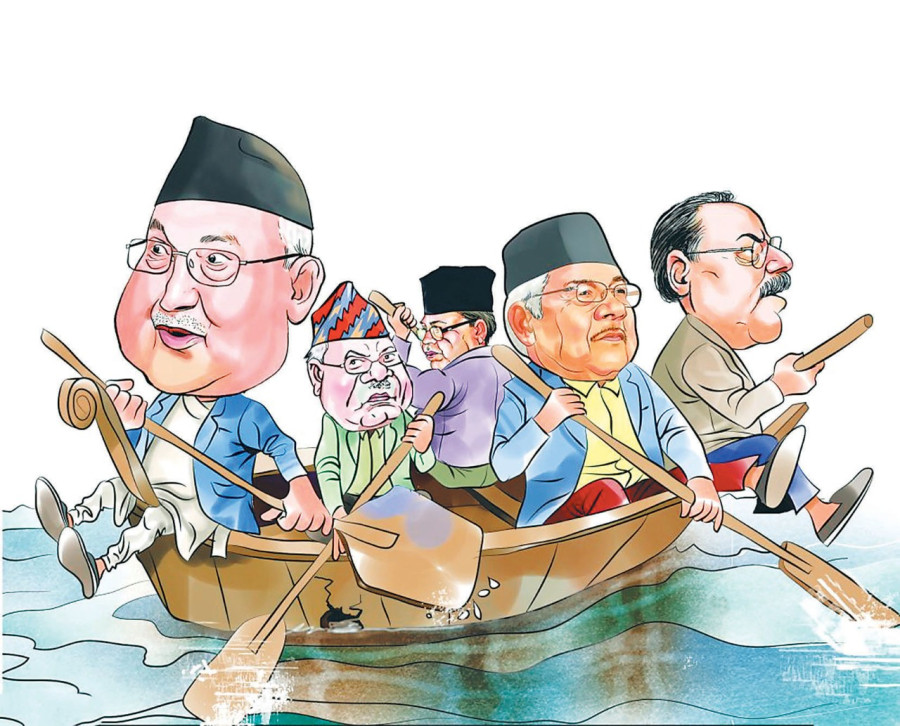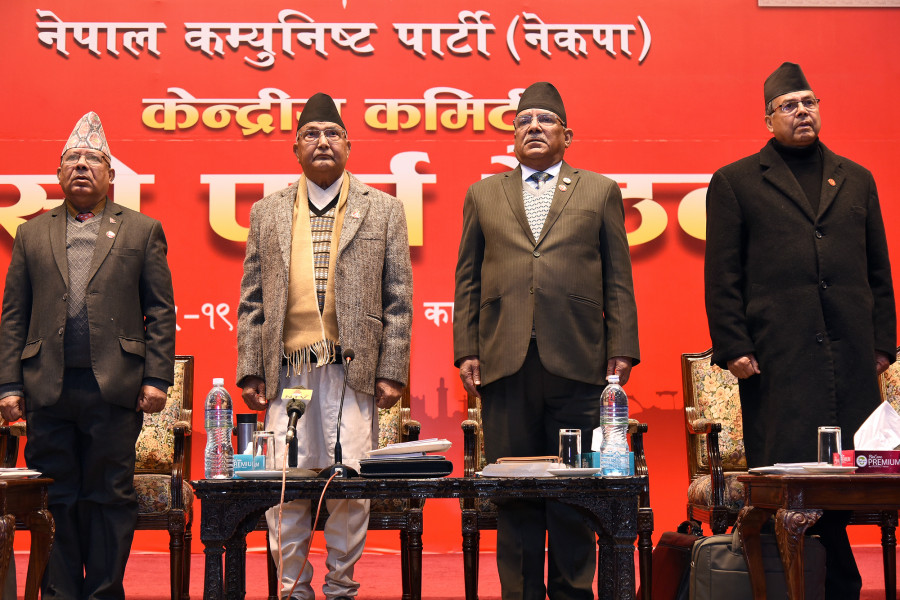Politics
How the strongest communist force in Nepali history came so close to imploding
Oli’s arrogance and Dahal’s ambition have both derailed the Nepal Communist Party so much that it is now on the verge of a split, party insiders and political analysts say.
Anil Giri
When KP Sharma Oli’s CPN-UML and Pushpa Kamal Dahal's Maoist Centre decided to forge an electoral alliance in October 2017, many were sceptical. The elections in November and December, however, put all doubts to rest. The two parties swept the elections and buoyed by their victory, in May 2018, two months after Oli assumed office as new prime minister, they announced a merger—giving birth to the Nepal Communist Party.
Oli and Dahal announced themselves as co-pilots of the aeroplane that was the biggest communist force in Nepali history.
The party has a near two-thirds majority in the federal parliament and governments in six of the seven provinces.
But on Thursday, after just two years of its merger, the Nepal Communist Party (NCP) looked headed for a split.
Party chairs Dahal and Oli are at an impasse, with the former having called for the latter's resignation as both party chair and prime minister. Oli is cornered, having lost support in the Secretariat and the Standing Committee.
Oli prorogued Parliament on Thursday and is readying an ordinance that will make it easier for him to split the party. He's also courting the opposition and appears ready to go his own way rather than resign.
Behind this current state of affairs are the defining qualities of the two chairs—Oli with his naked arrogance and Dahal with his unfettered ambition, say political analysts and party insiders.
“The party gave Oli an almost free hand for two years to run the government but Oli chose to walk alone. He put one leg in the party and the other in government, and he failed on both fronts," said political commentator Krishna Pokhrel, who is also a professor of political science at Tribhuvan University

When the party united, the former UML had a majority in the Secretariat, Standing Committee and Central Committee, but Oli lost support on all fronts.
"The way Oli squandered that majority showcases his spectacular failure,” said Pokhrel.
Pokhrel believes that Oli, as the party chair and prime minister, should shoulder most of the blame for the current crisis in the party.
After getting to the helm of the most powerful government in the country in more than two-and-a-half decades, Oli began to display an authoritarian streak, worrying party members. He surrounded himself with a small coterie of party members and advisers and began to sidestep the party Secretariat.
"He appeared to forget that he was co-chair with Dahal," one Standing Committee member told the Post. "He would push through his decisions in the party."
Dahal, who ran his Maoist party for more than three decades uncontested, chafed under Oli. Despite being co-chair, Dahal was rarely consulted on decisions. The experience was new—and uncomfortable.
But Dahal wasn't the only leader that Oli had alienated. Senior leaders and former prime ministers Madhav Kumar Nepal and Jhala Nath Khanal, who had both led the UML in the past, began to feel sidelined with little to do.
"Oli pushed his own former comrades beyond the wall," said Pokhrel.
Nepal, especially, felt slighted. Crucial party decisions were made when he was out of the country and he was relegated to the fourth place in the party hierarchy.
This made Nepal unhappy and pushed him closer towards Dahal, a party leader who has close relations with Nepal told the Post.
Another significant persona in this drama was Bamdev Gautam, an ambitious party leader who became the lynchpin in the push-and-pull between Oli on the one hand and Dahal and Nepal on the other.
Gautam had been unhappy with Oli ever since he lost the elections from Bardiya. He has always believed that Oli engineered his defeat. He too began to side with Dahal.
Bolstered by support from former UML leaders, Dahal began to confront Oli, raising the subject of a gentlemen’s accord between him and Oli. The agreement, according to Dahal, was that he and Oli would lead the government in turns.
"Dahal and Oli had agreed to run the government on a rotational basis during the party unification process, but Oli refused to honour that pact," said one Central Committee member from the former Maoist party. "Then, Dahal began to publicly criticise the performance of the Oli government."
Tensions were defused between Oli and Dahal when the two leaders decided, in a meeting with President Bidya Bhandari, to a power-sharing agreement. Oli would run the government for the full five-year term while Dahal would become executive chair in the party, with more responsibility.
Oli, however, failed to honour that deal too, almost immediately saying that he was the "senior leader" in the party. He continued to run the government and the party on his own, incensing Dahal, say party insiders.
This time around, Dahal built a bigger alliance, getting Nepal, Khanal and Gautam all on his side, in what came to be known as the 'Bhaisepati alliance.'
In the Secretariat meeting in the second week of April, Dahal and company were already planning to call for Oli's resignation when Oli narrowly managed to get Gautam over on his side, foiling the attempt.
But controversies continued.
When Covid-19 hit and the country went into lockdown, the Oli government almost immediately landed in controversy over irregularities in the procurement of medical supplies from China.
Several controversial Bills related to mass media, information and communication, and the guthi system, emerged. But the dispute inside the ruling party heightened after Oli introduced two controversial ordinances, one that amended an existing provision in the Political Parties Act to only require 40 percent support from either the Central Committee or the parliamentary party in order to split the party. Earlier, a split vote required 40 percent support from both the central committee and the parliamentary party.
The ordinance was withdrawn but not before a massive controversy that included allegations of kidnapping and a forced party split.
Most of the ruling party leaders had had enough by this time. Twenty Standing Committee members officially demanded a meeting of the committee in order to address these controversies, but Oli seized any opportunity to postpone it.
“Initially, the feud was between Oli and Dahal, but with now, the purview of this rift within the ruling party has widened and there are more actors involved now,” said political analyst Khagendra Prasai.
When the boundary dispute with India emerged in early May, it was a godsend for Oli. He quickly adopted a harsh nationalist stance, pushing through the release of a new map that incorporated Kalapani, Limpiyadhura and Lipulekh, areas India also claims.
Everyone in the ruling party and even the opposition fell in line behind the prime minister, lest they be tarred ‘anti-nationalist’. But when the map had been incorporated into the constitution, they pounced. Calls for a Standing Committee meeting began anew, and this time, Oli had run out of excuses to postpone it.
The Bhaisepati alliance was reconstituted and Oli’s opponents began to organise. Knowing the deck was stacked against him, Oli publicly accused India of a conspiracy to unseat him for the publication of the new map.
The Standing Committee was duly held and on the second day, this Tuesday, Dahal, along with Nepal, Khanal, Gautam and 11 other committee members, formally asked Oli to resign as both party chair and prime minister.
“It is not India but I, who is demanding your resignation,” said Dahal at the meeting.
Oli was quick to react, holding a meeting with President Bhandari, and proroguing Parliament. Party leaders believe that Oli will reissue the ordinance that eased party splits, split the party and ally with the Nepali Congress to remain in power.
With animosities coming to a head and party leaders scrambling to shore up their own positions, there are those within the party who believe that the Nepal Communist Party has lost its way.
“This current crisis is for managing leaders, not the grievances of the general public,” said Surendra Karki, a former minister and party central committee member. “As a strong communist party ruling the country, we should work in favour for the working class, the poor and the marginalised.”
On Friday, in an attempt to defuse tensions, a meeting was called between Oli and Dahal, with General Secretary Bishnu Poudel and former minister Janardan Sharma in attendance. The latter two were invited as they had been formal witnesses to the party unification agreement between the CPN-UML and the CPN (Maoist Centre).
During the three-hour long meeting on Friday, Oli made it clear that he was not going to step down as prime minister and party chair, according to a party Secretariat member briefed by Dahal. Dahal, meanwhile, asked Oli to abandon one post for the larger interest of the party. Oli refused.
Most party leaders believe that Oli is responsible for the current crisis, but that could just be expediency, as they know which way the wind is blowing.
“As the prime minister, it is Oli who played the larger role in bringing about this situation,” said Standing Committee member Raghuji Pant, who is from the Nepal faction.
If Oli had played a responsible role as prime minister and a party chair, the crisis would never have surfaced, he said.
“The two leaders will meet again before Saturday’s Standing Committee, which will then decide the future course of the party,” said the Secretariat member, “whether it will split or remain unified.”




 10.12°C Kathmandu
10.12°C Kathmandu















